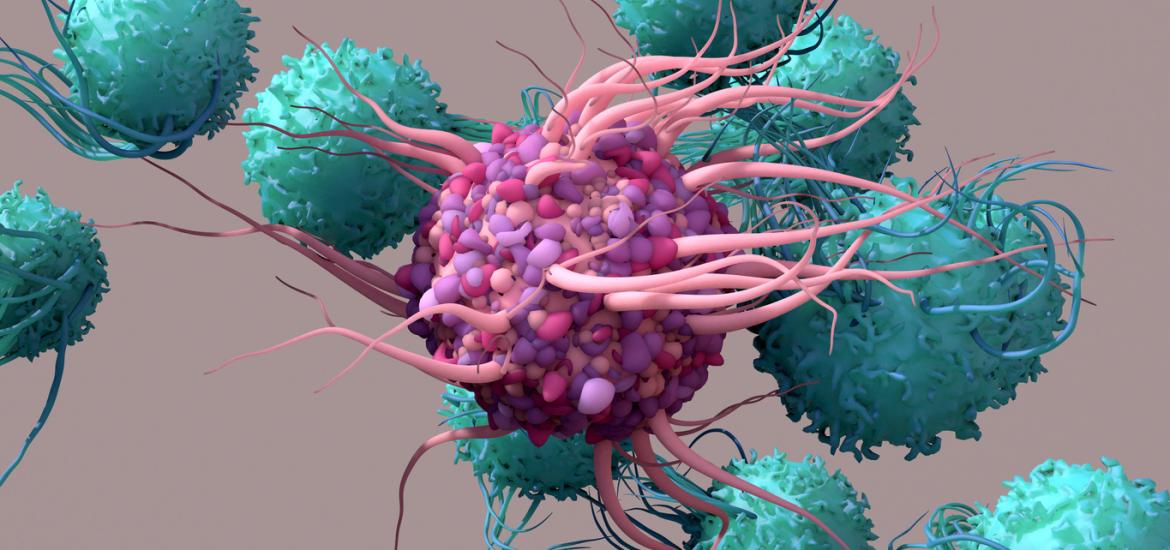
ImmunityBio follows through in lung cancer
A new phase 3 study will test Anktiva in PD-(L)1-relapsed lung cancer.
A new phase 3 study will test Anktiva in PD-(L)1-relapsed lung cancer.

After last year's ostensibly positive but uncontrolled lung cancer data for ImmunityBio's lead asset, Anktiva, the group has moved forward with a pivotal trial in this setting, due to start this month.
The new study, called ResQ201A and unveiled in a new listing on the clinicaltrials.gov registry, is notable for testing the earlier mid-stage finding in a controlled setting. The idea is that Anktiva might resensitise NSCLC patients who relapse on anti-PD-(L)1 therapy, turning "cold" tumours "hot", and ResQ201A will test this thesis versus docetaxel.
After numerous setbacks Anktiva, an IL-15 agonist that now carries the INN nogapendekin alfa, received US approval last April for BCG-unresponsive non-muscle invasive bladder cancer. Shortly afterwards ImmunityBio claimed that the drug caused “significant prolongation of OS” in the uncontrolled phase 2 Quilt 3.055 study in NSCLC patients pretreated with immune checkpoint inhibitors.
Phase 3 promise
Last September ImmunityBio said those data supported the global launch of phase 3 studies of Anktiva plus Keytruda or Opdivo in first and second-line NSCLC versus standard of care.
It seems that the new ResQ201A study meets this pledge. However, it will be noted that at the time ImmunityBio floated the promise of phase 3 trials it called the potential second-line NSCLC study ResQ302 rather than ResQ201A; it's possible that ResQ302 will be launched later, and will somehow differ from ResQ201A.
For now the design of ResQ201A is clear. 460 NSCLC patients are to be recruited, with the requirement for them to have developed disease progression after initially reporting response or stable disease after immune checkpoint inhibitor therapy. Genetic alterations are also allowed, but patients with EGFR L858R or exon 19 deletion mutations must have received Tagrisso.
Anktiva will be combined with Opdivo and docetaxel in ResQ201A's active cohort, and this regimen will be compared against docetaxel alone. The primary endpoint is overall survival.
World Lung
After toplining Anktiva's phase 2 NSCLC success ImmunityBio presented more data from the Quilt 3.055 trial at last year's World Conference on Lung Cancer.
This analysis comprised 86 NSCLC patients who had progressed on Keytruda or Opdivo, with or without chemo, and cited median OS of 14.1 months, with the additional claim that one patient was still alive at 58 months. Survival seemed to be independent of PD-L1 status, with mOS coming in at 13.8 months for PD-L1-positive and 15.8 months for PD-L1-negative patients.
ImmunityBio said the OS data exceeded standard of care, having earlier cited 7-9 months as a historical comparator. However, the Tropion-Lung01 trial of datopotamab deruxtecan in a similar second-line NSCLC setting yielded 11 months in its chemo control arm, and if this is now the real-world comparator Anktiva's 14.1 months seems somewhat less impressive.
The withdrawal of dato-dxd's US and EU filings in second-line NSCLC shows what a tough – and sill very financially interesting – space this is. Only a direct comparison will show whether Anktiva really makes a difference, and ImmunityBio is now embarking on such a comparison.
Selected trials of Anktiva in NSCLC
| Line of treatment | Study | Design |
|---|---|---|
| Second line | ResQ201A (ph3) | Opdivo/Keytruda + docetaxel combo, vs docetaxel |
| Second line | ResQ302 (ph3) | Undisclosed (trial not yet started) |
| First line | Quilt-2.023 (ph3) | Keytruda/Opdivo/Yervoy +/- chemo combo, vs Keytruda +/- chemo |
| First line | ResQ301 (ph3) | Undisclosed (trial not yet started) |
| Second line | Quilt-3.055 (ph2) | Uncontrolled Keytruda/Opdivo combo |
Source: OncologyPipeline.
2209













